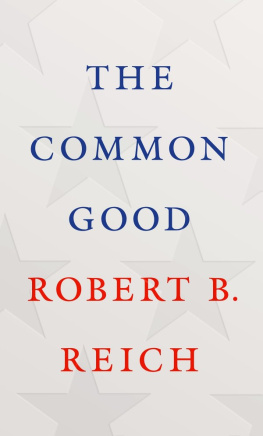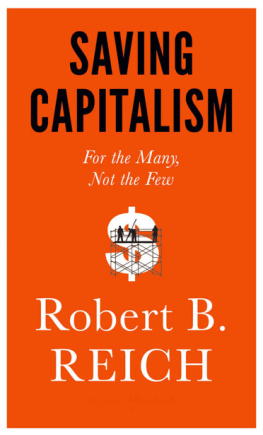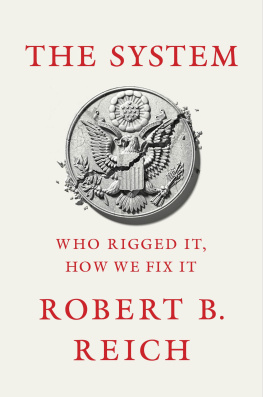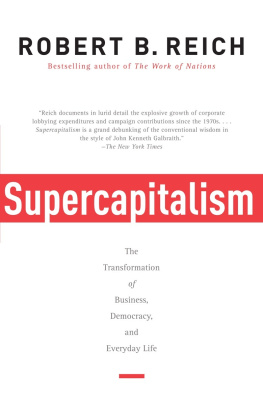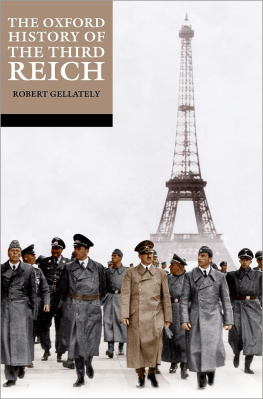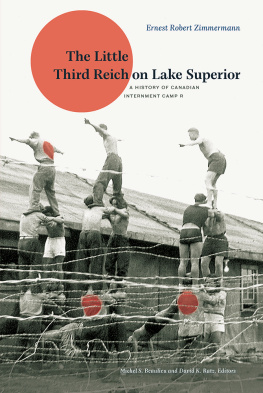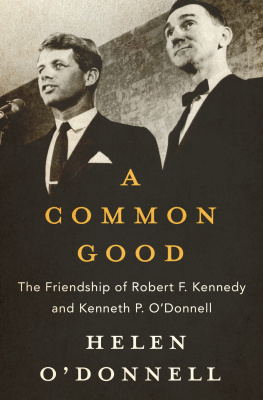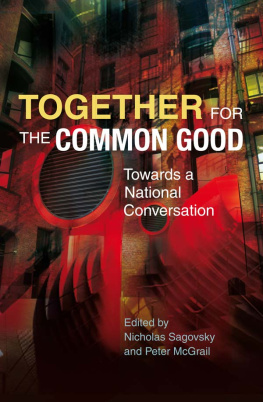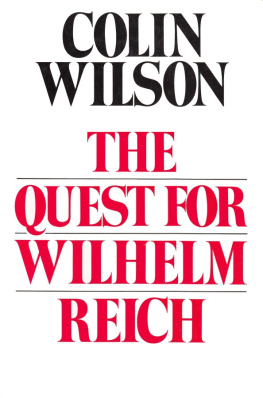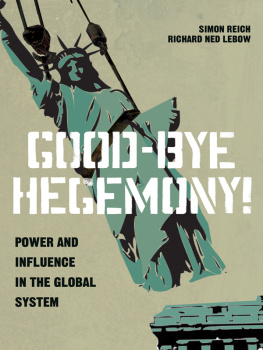Robert B. Reich - The common Good
Here you can read online Robert B. Reich - The common Good full text of the book (entire story) in english for free. Download pdf and epub, get meaning, cover and reviews about this ebook. year: 0, genre: Science / Politics. Description of the work, (preface) as well as reviews are available. Best literature library LitArk.com created for fans of good reading and offers a wide selection of genres:
Romance novel
Science fiction
Adventure
Detective
Science
History
Home and family
Prose
Art
Politics
Computer
Non-fiction
Religion
Business
Children
Humor
Choose a favorite category and find really read worthwhile books. Enjoy immersion in the world of imagination, feel the emotions of the characters or learn something new for yourself, make an fascinating discovery.
- Book:The common Good
- Author:
- Genre:
- Year:0
- Rating:5 / 5
- Favourites:Add to favourites
- Your mark:
- 100
- 1
- 2
- 3
- 4
- 5
The common Good: summary, description and annotation
We offer to read an annotation, description, summary or preface (depends on what the author of the book "The common Good" wrote himself). If you haven't found the necessary information about the book — write in the comments, we will try to find it.
The common Good — read online for free the complete book (whole text) full work
Below is the text of the book, divided by pages. System saving the place of the last page read, allows you to conveniently read the book "The common Good" online for free, without having to search again every time where you left off. Put a bookmark, and you can go to the page where you finished reading at any time.
Font size:
Interval:
Bookmark:
Saving Capitalism
Beyond Outrage
Aftershock
Supercapitalism
Reason
Ill Be Short
The Future of Success
Locked in the Cabinet
The Work of Nations
The Resurgent Liberal
Tales of a New America
The Next American Frontier
The Power of Public Ideas
New Deals
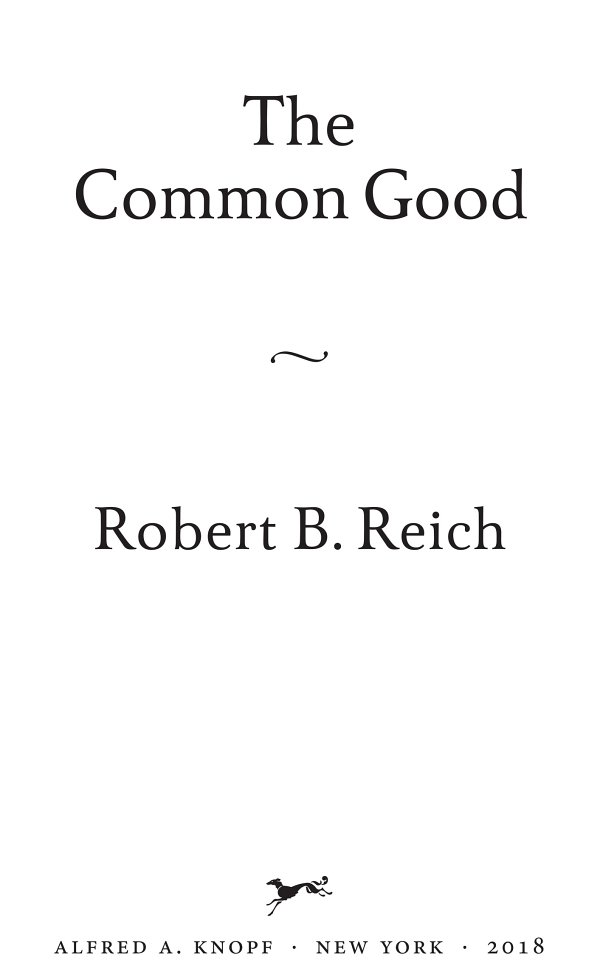
THIS IS A BORZOI BOOK PUBLISHED BY ALFRED A. KNOPF
Copyright 2018 by Robert B. Reich
All rights reserved. Published in the United States by Alfred A. Knopf, a division of Penguin Random House LLC, New York, and distributed in Canada by Random House of Canada, a division of Penguin Random House Canada Limited., Toronto.
www.aaknopf.com
Knopf, Borzoi Books, and the colophon are registered trademarks of Penguin Random House LLC.
Library of Congress Cataloging-in-Publication Data
Names: Reich, Robert B., author.
Title: The common good / Robert B. Reich.
Description: First edition. | New York : Alfred A. Knopf, 2018.
Identifiers: LCCN 2017053384 | ISBN 9780525520498 (hardcover) | ISBN 9780525520504 (ebook)
Subjects: LCSH : Common good. | CitizenshipMoral and ethical aspectsUnited States. | Political ethicsUnited States. | EconomicsMoral and ethical aspectsUnited States.
Classification: LCC JC 330.15 . R 455 2018 | DDC 323.6/50973dc23 LC record available at https://lccn.loc.gov/2017053384
Ebook ISBN9780525520504
Cover design by Tyler Comrie
v5.2_r1
ep
To my dearest Perian
I WAS AT the impressionable age of fourteen when I heard John F. Kennedy urge us not to ask what America can do for us but what we can do for America. Seven years later I took a job as a summer intern in the Senate office of his brother Robert F. Kennedy. It was not a glamorous job, to say the least. I felt lucky when I was asked to run his signature machine. But I told myself that in a very tiny way I was doing something for the good of the country.
That was a half century ago. I wish I could say America is a better place now than it was then. Surely our lives are more convenient. Fifty years ago there were no cash machines or smartphones, and I wrote my first book on a typewriter. As individuals, we are as kind and generous as ever. We volunteer in our communities, donate, and help one another. We pitch in during natural disasters and emergencies. We come to the aid of individuals in need. We are a more inclusive society, in that African Americans, women, and gays have legal rights they didnt have a half century ago. Yet our civic lifeas citizens in our democracy, participants in our economy, managers or employees of companies, and members or leaders of organizationsseems to have sharply deteriorated. What we have lost, I think, is a sense of our connectedness to each other and to our idealsthe America that John F. Kennedy asked that we contribute to.
Starting in the late 1970s, Americans began talking less about the common good and more about self-aggrandizement. The shift is the hallmark of our era: from the Greatest Generation to the Me Generation, from were all in it together to youre on your own. In 1977, motivational speaker Robert Ringer wrote a book that reached the top of the New York Times best-seller list entitled Looking Out for # 1. It extolled the virtues of selfishness to a wide and enthusiastic audience. The 1987 film Wall Street epitomized the new ethos in the character Gordon Gekko and his signature line, Greed, for lack of a better word, is good.
The past five decades have also been marked by growing cynicism and distrust toward all of the basic institutions of American societygovernment, the media, corporations, big banks, police, universities, charities, religious institutions, the professions. There is a wide and pervasive sense that the system as a whole is no longer working as it should. A growing number of Americans feel neglected and powerless. Some are poor, or black or Latino; others are white and have been on a downward economic escalator for years. Many in the middle also feel stressed and voiceless. Whether we call ourselves Democrats or Republicans, liberals or conservatives, we share many of the same anxieties and feel much of the same distrust. We have nonetheless been cleaved into warring ideological tribes, and tribes within those tribes. Some of us have even been seduced by demagogues and conspiracy theorists. We seem to be a long way from when John F. Kennedy asked that Americans contribute to the well-being of all. We no longer even discuss what we owe one another as members of the same society.
As I write this, I am now a septuagenarian and Donald Trump is president. In many ways Trump epitomizes what has gone wrong. But as I hope to make clear, Trump is not the cause. He is a consequencethe logical outcome of what has unfolded over many years. His election was itself propelled by widespread anxieties, and distrust toward our political and economic system. Say what you want about him, Trump has at least brought us back to first principles. Some presidents, like Ronald Reagan, got us talking about the size and role of government. Trump has got us talking about democracy versus tyranny. Some presidents, like Bill Clinton, invited a discussion of how we can make the most of ourselves. Trump, by dint of his pugnacious character and the divisiveness he has fueled, raises the question of what connects us, of what we hold in common.
Hence, this book.
Is there a common good that still binds us together as Americans? That its even necessary to ask shows how far weve strayed. Today, some think were connected by the whiteness of our skin, or our adherence to Christianity, or the fact that we were born in the United States. I believe were bound together by the ideals and principles we share, and the mutual obligations those principles entail.
My hope is that this book provokes a discussion of the good we have had in common, what has happened to it, and what we might do to restore it. Perhaps this book can even provide a means for people with opposing views to debate these questions civilly. My goal is not that we all agree on the common good. It is that we get into the habit and practice of thinking and talking about it, and hearing one anothers views about it. This alone would be an advance.
I should clarify from the start what this book is not. It is not about communism or socialism, although in this fractious era I wouldnt be surprised if the word common in the title causes some people to assume it is. It is not a book about what progressives or Democrats or Republicans ought to do to win elections, what messages they should convey, or policies they should propose. There is already quite enough advice to go around. And its not a book about Donald Trump, although he does come up from time to time.
It is a book about what we owe one another as members of the same societyor at least what we did owe one another more than a half century ago when I heard John F. Kennedys challenge. It is about the good we once had in commonand, if we are to get back to being a far better functioning society, must have again.
B EGIN WITH Martin Shkreli. Pale, thin, and boyish, with dark hair and an impish grin, Shkreli in early life exemplified the rags-to-riches American success story. He was born in Brooklyn, New York, in March 1983, to parents who emigrated from Albania and worked as janitors in New York apartment buildings. Shkreli attended New Yorks Hunter College High School, a public school for intellectually gifted young people, and in 2004 received a bachelors degree in business administration from Baruch College. Almost from the start, Shkreli showed a knack for finding unique ways to make lots of money. He started his own hedge fund, betting that the stock prices of certain biotech companies would drop.
Font size:
Interval:
Bookmark:
Similar books «The common Good»
Look at similar books to The common Good. We have selected literature similar in name and meaning in the hope of providing readers with more options to find new, interesting, not yet read works.
Discussion, reviews of the book The common Good and just readers' own opinions. Leave your comments, write what you think about the work, its meaning or the main characters. Specify what exactly you liked and what you didn't like, and why you think so.

